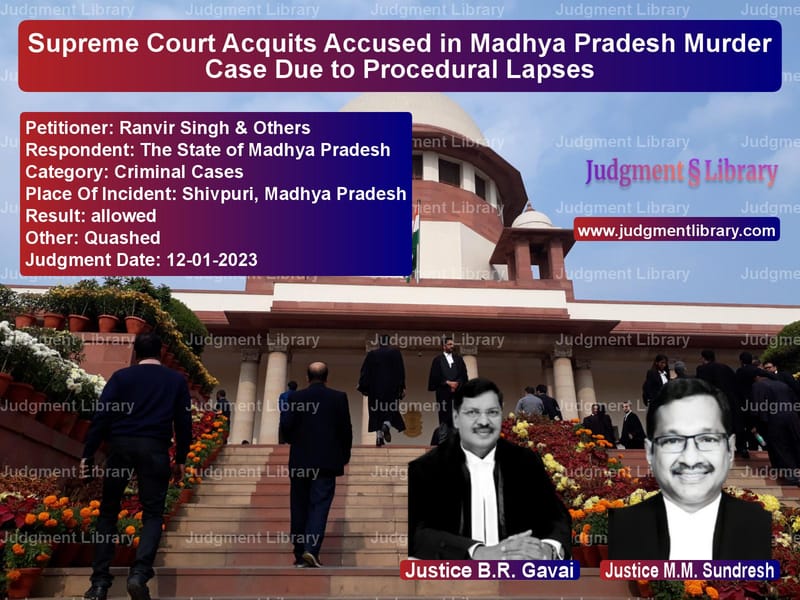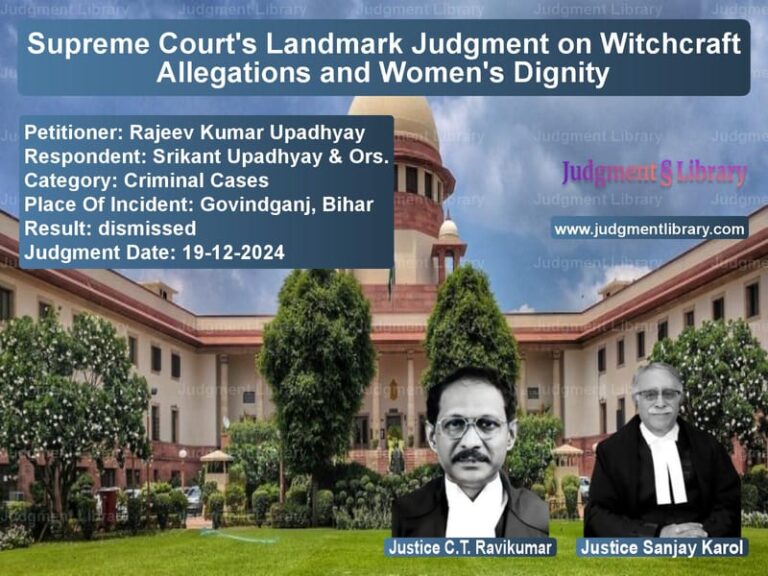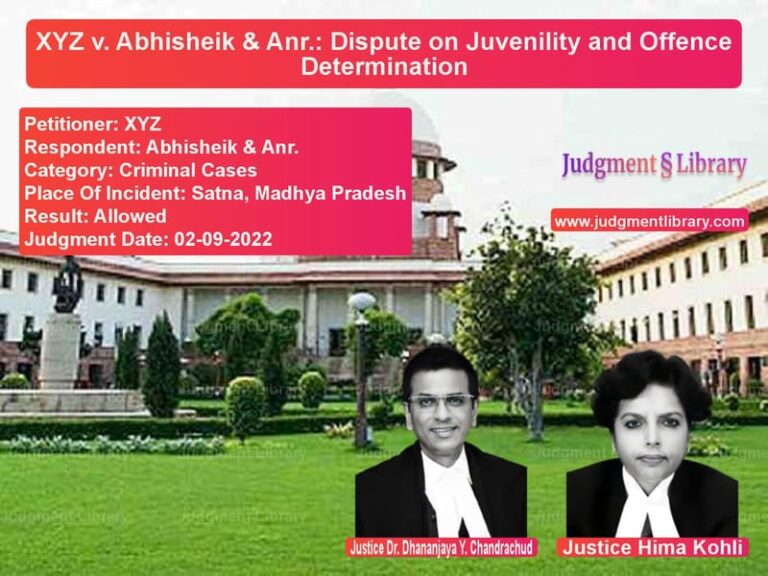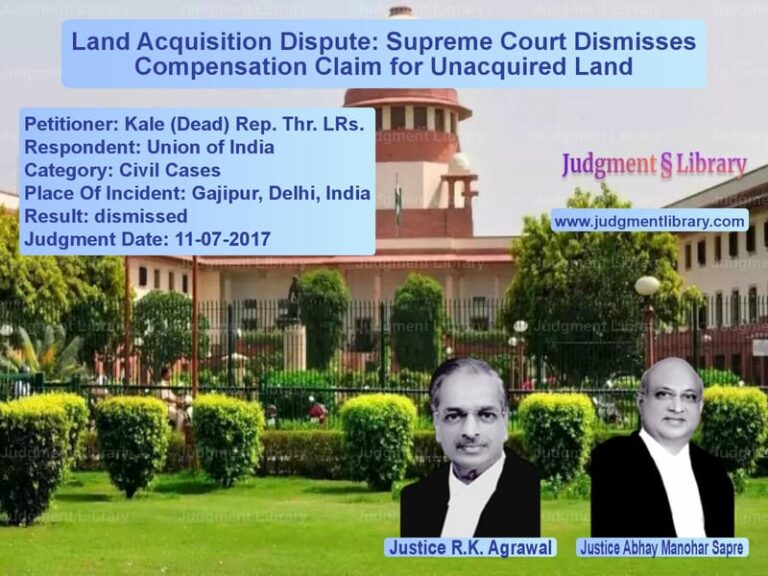Supreme Court Acquits Accused in Madhya Pradesh Murder Case Due to Procedural Lapses
The case of Ranvir Singh & Others v. The State of Madhya Pradesh involved a dispute that escalated into a violent confrontation, resulting in the deaths of two individuals. The Supreme Court overturned the life imprisonment sentence of the accused due to inconsistencies in witness statements, procedural lapses in investigation, and doubts over the validity of the alleged dying declaration.
Background of the Case
The incident occurred on July 25, 1992, at approximately 10:00 AM in the Shivpuri district of Madhya Pradesh. The dispute originated from tensions between the appellants and the deceased over a water-related issue and land ownership. The prosecution alleged that the accused, along with others, armed with weapons, attacked the deceased Hukum Singh and Kishori Kachi, inflicting fatal injuries.
Initially, the trial court convicted the accused under Sections 148, 302/149, and 324/149 of the Indian Penal Code (IPC), sentencing them to life imprisonment. The Madhya Pradesh High Court modified the conviction, reducing it to seven years under Section 304 Part II IPC for the death of Hukum Singh while maintaining life imprisonment for Kishori Kachi’s murder. The accused then appealed to the Supreme Court.
Key Legal Issues
1. Reliability of the Dying Declaration
The prosecution relied on a dying declaration allegedly made by Hukum Singh. However, the Supreme Court found:
- The declaration was recorded by the investigating officer instead of a magistrate.
- It contained language suggestive of legal terminology, which raised doubts about its authenticity.
- The thumb impression of the deceased was suspiciously placed in a manner that suggested later alterations.
The Court ruled:
“The deceased’s physical condition at the time of recording the statement was questionable, making it unsafe to rely on the dying declaration.”
2. Contradictions in Witness Testimonies
The Supreme Court found serious inconsistencies in the statements of key prosecution witnesses (PW-1, PW-4, PW-12, and PW-18):
- Several witnesses identified the accused for the first time in court, raising concerns about suggestive identification.
- Different versions emerged regarding the sequence of events and the number of attackers present.
- PW-12, an injured witness, did not report the incident or testify before the police, further weakening the prosecution’s case.
3. Failure to Conduct a Proper Investigation
The Court criticized the investigating officer (PW-20) for:
- Failing to conduct a test identification parade.
- Recording multiple, conflicting FIRs.
- Not consulting medical professionals before recording the alleged dying declaration.
The Court noted:
“The role of an investigating officer is to ascertain the truth. However, the suppression of crucial evidence and contradictory reports weaken the prosecution’s case.”
4. Applicability of Section 149 IPC (Unlawful Assembly)
The prosecution alleged that over 50-100 persons were involved in the attack. However, the Court ruled that Section 149 IPC, which imposes vicarious liability for unlawful assembly, could not be applied because:
- The prosecution failed to explain why many other alleged attackers were not charged.
- The evidence suggested a one-sided attribution of blame.
- There was no clear evidence linking each accused to a specific role in the crime.
The Court stated:
“Applying Section 149 IPC requires conclusive proof of shared intent, which is missing in this case.”
Supreme Court’s Judgment
The Supreme Court ruled in favor of the appellants, acquitting them due to:
- The unreliable dying declaration.
- Inconsistent witness statements.
- The prosecution’s failure to establish guilt beyond a reasonable doubt.
The Court held:
“Given the material contradictions, procedural lapses, and lack of credible evidence, the benefit of the doubt must go to the accused.”
Implications of the Judgment
This ruling has significant implications for criminal law and due process:
- Importance of Procedural Fairness: The judgment reinforces that dying declarations must be recorded by competent authorities, preferably a magistrate.
- Need for Reliable Witness Testimonies: Courts must be cautious when witnesses identify accused persons for the first time in court.
- Burden of Proof on Prosecution: The ruling reaffirms that the prosecution must prove its case beyond a reasonable doubt, especially in cases involving life imprisonment.
Conclusion
The Supreme Court’s decision in Ranvir Singh & Others v. The State of Madhya Pradesh underscores the importance of procedural integrity in criminal trials. By highlighting flaws in the investigation, witness inconsistencies, and errors in applying Section 149 IPC, the Court ensured that justice was not compromised by weak or fabricated evidence. This judgment serves as a precedent for maintaining fairness and upholding the rights of the accused in serious criminal cases.
Petitioner Name: Ranvir Singh & Others.Respondent Name: The State of Madhya Pradesh.Judgment By: Justice B.R. Gavai, Justice M.M. Sundresh.Place Of Incident: Shivpuri, Madhya Pradesh.Judgment Date: 12-01-2023.
Don’t miss out on the full details! Download the complete judgment in PDF format below and gain valuable insights instantly!
Download Judgment: ranvir-singh-&-other-vs-the-state-of-madhya-supreme-court-of-india-judgment-dated-12-01-2023.pdf
Directly Download Judgment: Directly download this Judgment
See all petitions in Murder Cases
See all petitions in Bail and Anticipatory Bail
See all petitions in Custodial Deaths and Police Misconduct
See all petitions in Legal Malpractice
See all petitions in Judgment by B R Gavai
See all petitions in Judgment by M.M. Sundresh
See all petitions in allowed
See all petitions in Quashed
See all petitions in supreme court of India judgments January 2023
See all petitions in 2023 judgments
See all posts in Criminal Cases Category
See all allowed petitions in Criminal Cases Category
See all Dismissed petitions in Criminal Cases Category
See all partially allowed petitions in Criminal Cases Category







